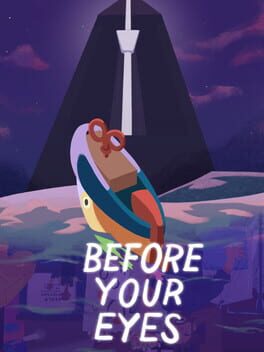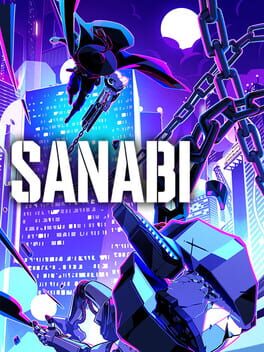tsyoo
Bio
Nothing here!
Badges

1 Years of Service
Being part of the Backloggd community for 1 year
069
Total Games Played
000
Played in 2024
039
Games Backloggd
Recently Played See More
Recently Reviewed See More
This review contains spoilers
Sanabi is a fast-paced 2D action platformer with clear and explicit inspiration from Katana Zero with the addition of a grappling hook being the core mechanic behind movement and combat. Seeing this description compelled me to try the game, but the experience was not exactly what I was expecting.
From the beginning, it takes a long time to actually get into any real gameplay, and this trend continues as the majority of levels get broken up constantly by 5-10 minutes of cutscenes before allowing the player to resume again. At some point, I started just skipping cutscenes because I wasn't going to make it through the game otherwise, and I did want to get through the game. Maybe I missed out on some character development or some interesting moments, but using my judgement to resume watching cutscenes, I don't think I ended up missing anything important. I know there was a big story to tell, but I think the way it was delivered was antithetical to what the game feels like it should be - focusing on intentional level and enemy design to fully support the fast and fluid systems in place. I wish I could give those high praise, but unfortunately I had some minor issues with the gameplay side of things as well.
I wasn't a fan of how the game slowly drops upgrades on you as the game progressed. Whenever I unlocked something and tried it out, my reaction was never, "Wow, this is a cool upgrade" but instead "Wow, this should have been available at the start of the game". The only power-up that might not fall under that category is the dashing attack and even there I was telling myself that I wish I didn't have to go through the start-up charge, which they eventually got rid of in another small boost. It seems to me like the developers really wanted to focus on slowly stacking one mechanic at a time, which is admirable, but the degree at which it is done almost feels like they don't trust the player to intuit what to do at times (they were still flashing back to the training grounds near the end of the game). I can figure out things like how a lock can open something on another screen or that platforms can block laser beams without a cutscene or a dedicated section to just teaching that interaction. While I don't think it's necessarily a bad thing, too much of it ended up making the first ~80% of the game feel like a demo or tutorial and also slowed down and prohibited what could have been some more interesting level design. The only complaint I have for the movement itself is that I think you should be able to drop faster after pulling yourself to the ceiling. I did encounter a few bugs, but they were pretty minor and I never felt like dying was a huge punishment anyways.
Speaking of design, there were a few bosses that didn't feel great either. For context, I played on veteran difficulty. I didn't enjoy the Justice fight as much as I wanted to. Sometimes it felt like you were being punished for not being able to dodge the circular move because you weren't in range of a car to grapple onto (not sure if the pattern for the cars were random or not, but they may as well have been). The Major Song encounter was the only fight that ended up giving me trouble. Sometimes the grapple would snap to her instead of the platform and I would get countered, and some of her attacks required a pretty fast reaction time to avoid normally. Additionally, having to wait for the charge to dash into her felt gross as she would often teleport away or simply hit you before you could dash. There was even a mind game of her being able to counter the dash, which was admittedly cool, but the only way to play around it was to sit in your charge a little longer to see if that's what she was going to do, which made it easier for her to get away or hit you. What ended up working for me for both bosses was just spinning in circles like a maniac, which is fine, but kind of strays away from the precise movement that I expected and know that the game is capable of.
The last section of the game involves traversing through the area of each chapter again with some increased difficulty and more thought into how each chapter's unique mechanic works and is only broken up by a cutscene at the end of each level. Here, you can really experience how fast you can go and how skilled you can feel and I wish that more of the game was like this.
Back to the story, my biggest gripe here is that I wish they were more subtle about giving details throughout the game. It was easy to suspect that Mari and the main character were connected, but once the personality data plot and worker hint were given, it became way too easy to figure out most of the details, so the grand and climactic reveal of what actually happened didn't feel very climactic since I had a sense of what was happening for a majority of the game. I also wish they weren't so blatant about the Katana Zero inspiration because every shot of the main character and Mari watching the city with a pronounced parallax effect felt too much like they were trying to capture that one Katana Zero moment, when it didn't really earn it yet. This is definitely the point where I'm reaching the most, and to be fair, I think the engine is just built around that parallax effect, but I could never stop thinking about it whenever I encountered a cutscene like that. I'm also not quite sure why they don't show the main character's sacrifice at the end. They do drive home the point that "getting to the end isn't important, it's how you get there", but by then you've already made the decision to not pursue the false "end" and I think it would've been much more important to show the culmination of your journey and just how much love and responsibility the hero has. It was also almost comical the way he walked off screen and it cut straight to his gravestone after just a few seconds.
I ended up saying a lot about this game, which feels fitting after the amount of dialogue that I went through or skipped. Although there was a lot, I actually didn't dislike it. I wanted to love it, but ended up just liking it instead. I didn't mention it yet, but the music and art style were great! For me, there was a lot of potential here. All of my issues were pretty minor, and I mostly had a good time playing and I was able to identify what I do and don't like about games and game design, which felt rewarding in its own way.
From the beginning, it takes a long time to actually get into any real gameplay, and this trend continues as the majority of levels get broken up constantly by 5-10 minutes of cutscenes before allowing the player to resume again. At some point, I started just skipping cutscenes because I wasn't going to make it through the game otherwise, and I did want to get through the game. Maybe I missed out on some character development or some interesting moments, but using my judgement to resume watching cutscenes, I don't think I ended up missing anything important. I know there was a big story to tell, but I think the way it was delivered was antithetical to what the game feels like it should be - focusing on intentional level and enemy design to fully support the fast and fluid systems in place. I wish I could give those high praise, but unfortunately I had some minor issues with the gameplay side of things as well.
I wasn't a fan of how the game slowly drops upgrades on you as the game progressed. Whenever I unlocked something and tried it out, my reaction was never, "Wow, this is a cool upgrade" but instead "Wow, this should have been available at the start of the game". The only power-up that might not fall under that category is the dashing attack and even there I was telling myself that I wish I didn't have to go through the start-up charge, which they eventually got rid of in another small boost. It seems to me like the developers really wanted to focus on slowly stacking one mechanic at a time, which is admirable, but the degree at which it is done almost feels like they don't trust the player to intuit what to do at times (they were still flashing back to the training grounds near the end of the game). I can figure out things like how a lock can open something on another screen or that platforms can block laser beams without a cutscene or a dedicated section to just teaching that interaction. While I don't think it's necessarily a bad thing, too much of it ended up making the first ~80% of the game feel like a demo or tutorial and also slowed down and prohibited what could have been some more interesting level design. The only complaint I have for the movement itself is that I think you should be able to drop faster after pulling yourself to the ceiling. I did encounter a few bugs, but they were pretty minor and I never felt like dying was a huge punishment anyways.
Speaking of design, there were a few bosses that didn't feel great either. For context, I played on veteran difficulty. I didn't enjoy the Justice fight as much as I wanted to. Sometimes it felt like you were being punished for not being able to dodge the circular move because you weren't in range of a car to grapple onto (not sure if the pattern for the cars were random or not, but they may as well have been). The Major Song encounter was the only fight that ended up giving me trouble. Sometimes the grapple would snap to her instead of the platform and I would get countered, and some of her attacks required a pretty fast reaction time to avoid normally. Additionally, having to wait for the charge to dash into her felt gross as she would often teleport away or simply hit you before you could dash. There was even a mind game of her being able to counter the dash, which was admittedly cool, but the only way to play around it was to sit in your charge a little longer to see if that's what she was going to do, which made it easier for her to get away or hit you. What ended up working for me for both bosses was just spinning in circles like a maniac, which is fine, but kind of strays away from the precise movement that I expected and know that the game is capable of.
The last section of the game involves traversing through the area of each chapter again with some increased difficulty and more thought into how each chapter's unique mechanic works and is only broken up by a cutscene at the end of each level. Here, you can really experience how fast you can go and how skilled you can feel and I wish that more of the game was like this.
Back to the story, my biggest gripe here is that I wish they were more subtle about giving details throughout the game. It was easy to suspect that Mari and the main character were connected, but once the personality data plot and worker hint were given, it became way too easy to figure out most of the details, so the grand and climactic reveal of what actually happened didn't feel very climactic since I had a sense of what was happening for a majority of the game. I also wish they weren't so blatant about the Katana Zero inspiration because every shot of the main character and Mari watching the city with a pronounced parallax effect felt too much like they were trying to capture that one Katana Zero moment, when it didn't really earn it yet. This is definitely the point where I'm reaching the most, and to be fair, I think the engine is just built around that parallax effect, but I could never stop thinking about it whenever I encountered a cutscene like that. I'm also not quite sure why they don't show the main character's sacrifice at the end. They do drive home the point that "getting to the end isn't important, it's how you get there", but by then you've already made the decision to not pursue the false "end" and I think it would've been much more important to show the culmination of your journey and just how much love and responsibility the hero has. It was also almost comical the way he walked off screen and it cut straight to his gravestone after just a few seconds.
I ended up saying a lot about this game, which feels fitting after the amount of dialogue that I went through or skipped. Although there was a lot, I actually didn't dislike it. I wanted to love it, but ended up just liking it instead. I didn't mention it yet, but the music and art style were great! For me, there was a lot of potential here. All of my issues were pretty minor, and I mostly had a good time playing and I was able to identify what I do and don't like about games and game design, which felt rewarding in its own way.
The Beginner's Guide revolves around the narrator who describes his history with an indie game developer named Coda and some of Coda's various projects. Often described as a "walking simulator", the game doesn't offer much in terms of gameplay, but in my opinion, the story and ideas it tells make it more than worth for the 1-2 hour playtime.
It's been years since I played it for the first time, but there are some moments that I still think about regularly. This is one of the first games I've played that really got me thinking about game development and how the developer can communicate to the player and create unique and powerful moments.
It's been years since I played it for the first time, but there are some moments that I still think about regularly. This is one of the first games I've played that really got me thinking about game development and how the developer can communicate to the player and create unique and powerful moments.
Before Your Eyes is a short game (roughly two hours) with very little gameplay but a compelling story. You're introduced as a wayward soul, picked up from the sea of the afterlife by a mysterious character known as the Ferryman, who listens to your character's life story. This recounting will determine whether your soul will move on to paradise or remain in purgatory, and as the player, you influence this by selecting from different choices and progressing through your memories by blinking - a unique mechanic set up by tracking your eyes from a camera. There is an option to use the mouse instead, but I would recommend playing with the camera first. There were tons of moments where I struggled to keep my eyes open when I desperately wanted to for a multitude of reasons, such as fighting back tears or focusing during a prolonged scene. And combined with the desire to take in as much of the dialogue and interactions with the characters as possible, this was a truly unique way for me to become immersed in the game - as soon as it clicked, I was hooked. This story is about what it means to grow up and pursue your dreams, the meaning behind what you choose to do and say, and the contrast between how beautiful and unfair life can be. The ending utterly broke me and I am so thankful to have been able to experience it. I still think about this game and what it has to say.


